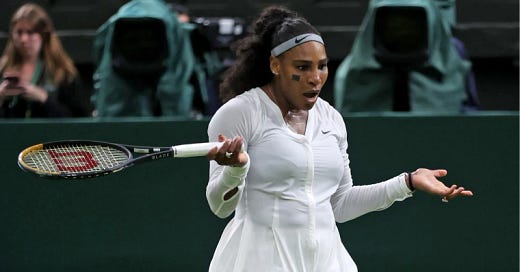How Much Should You Love Your Job?
Earlier this month, I was reading Mirin Fader’s piece in The Ringer, about the final season of WNBA legend Sylvia Fowles, and there was a stretch about Fowles’ interest in, of all things, mortuary science, that jumped out at me:
She has pursued her mortuary science degree while playing. That may surprise people who don’t know Fowles—that she could want and work for something so different, so far from basketball. But the beauty of Fowles is that she has always walked her own path. She can’t be put into any one box. She has never thought of herself purely as an athlete: “Basketball did not identify me at all.”
The game was purely a job to her, one she cherished and felt driven to be really, really good at it. Great, even. But she also enjoyed other things. Knitting, drawing, cooking, reading, jazz.
She is used to people not understanding her. They can’t reconcile her love for basketball with the other parts of her identity; that she can happily leave the game without feeling bereft. That she can know in her bones that she has value in the world even if she had never scored a single point.
On the one hand, this is just the kind of thing you write about an athlete who is retiring: They’re excited to start a new chapter; they look forward to pursuing all their other interests; they’re not “purely an athlete”; etc. You don’t want to make the person’s retirement sound too depressing, after all.
But on the other hand, it’s hard for me to imagine these paragraphs being written about a male athlete. In general, male athletes are not socialized to think of sports as “purely a job.” When such a thing gets said or written about male athletes, it’s usually as a criticism: He doesn’t care enough! It’s purely a job to him!
Fader’s piece on Fowles is concerned with this issue in a more thoughtful, serious way. It traces Fowles’ feelings about basketball from her days as a kid, when she was insecure about her height, through the pain of injuries, and the highs of her great pro career, recognizing that it was not always a simple relationship. Fowles comes off as someone who loves her job and is incredibly proud of what she has accomplished, but who could easily imagine a world where she was happy doing something else.
Then, just a few days later, there was a very different version of this same process, when Serena Williams announced in Vogue she would be retiring – sorry, she calls it “evolving” – from tennis at the end of the year. Williams is obviously in a very different position than Fowles. Or anyone, really: She is pretty unique in the history of sports. She is operating at the height of fame, on-court success, and financial compensation, to a degree few athletes – male or female – have ever operated.
And yet in her announcement, she too reckons with the tradeoffs that have come with her job, specifically her desire to grow her family. Her points about motherhood have obviously gotten the most attention on this front:
“Believe me, I never wanted to have to choose between tennis and a family. I don’t think it’s fair. If I were a guy, I wouldn’t be writing this because I’d be out there playing and winning while my wife was doing the physical labor of expanding our family. Maybe I’d be more of a Tom Brady if I had that opportunity.”
But I think it would be a mistake to miss the larger context in which this quote occurs. Because her piece is generally about how much she is dreading the prospect of life without tennis, which is something all athletes must deal with:
“There is no happiness in this topic for me. I know it’s not the usual thing to say, but I feel a great deal of pain. It’s the hardest thing that I could ever imagine. I hate it. I hate that I have to be at this crossroads. I keep saying to myself, I wish it could be easy for me, but it’s not.”
It is tempting to set up some false dichotomy between Fowles and Williams, between loving your job and NEEDING your job. Indeed, so much sports commentary accepts that framing, and insists that people like Serena and Michael Jordan and Tom Brady and the other supposed GOATs, only accomplished what they accomplished out of some pathological need to be the greatest. But I suspect mostly that is bullshit. The difference between all-time greats like Serena, Jordan, et. al. and the merely very, very good like Fowles, is mostly driven by luck and circumstances that, ex post facto, gets recontextualized as a personality trait.
The question I’m pondering now is: Who would you rather be? When I read Fowles’ reaction to retirement, my thought was, Wow, that seems really healthy, and I’m so excited for her career as a mortician. And when I read Williams’ piece, my thought was, She sounds nuts. But part of the charm of sports is that motivations that would seem nuts in any other context – the monomaniacal pursuit of individual excellence – are not only accepted but encouraged. If I had to pick someone’s athletic career, I would take Serena’s over Fowles’ every time, and not just because of the disparity in wealth and fame.
Should we generalize that lesson? Should we all try to treat our work the way Serena Williams treats hers? I certainly don’t think so: If you hear someone saying you should be as passionate and driven as Serena is, usually your boss is about to ask you to work extra. But then how do we appreciate her accomplishments without valorizing an unhealthy relationship to work? I’m not exactly sure how to answer this question, but I think it’s important to any movement for a more egalitarian future.



